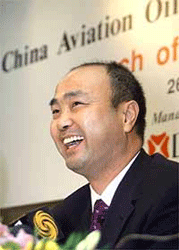
Chen Jiulin, the former head of Singapore-based China Aviation
Oil. (file photo)
When China Aviation Oil (Singapore) Co. Ltd. announced late last month, the
company had lost over US$550 million in financial derivatives trading, the whole
business world was shocked.
Its chief executive, Chen Jiulin once touted as a rising business star in
Asia, was accused of unauthorized speculation on the financial market. And
industry observers said he made the same mistake Nick Leeson made in 1995. Then
29-year-old Nick Leeson gambled on the financial market and brought down his
employer British Barring Bank.
The question was then raised: Who is Chen? What did he do to bring China
Aviation Oil to the ground?
Chen was born in the 1961. Though he spent his childhood in turbulent
Cultural Revolution, he managed to receive sufficient schooling. He went to
Beijing University in 1982 at a rather mature age. He spent five years studying
Vietnamese in the Department of Oriental Languages.
Though there is no evidence that he received formal business trading, Chen's
natural acumen landed him important positions in airline companies he joined. He
worked as a translator in many important negotiations. And he later received a
law degree from China University of Law and Administration.
In 1997 his employer China Aviation Oil Holdings gave him a task to establish
China Aviation Oil in Singapore. His initial capital was US$210,000.
Backed by strong demand for aviation oil on the Chinese mainland, Chen soon
turned his small firm into an influential company. By 2003 China Aviation Oil
was worth 3 billion yuan (US$326 million). And in 2002 his yearly salary reached
S$4.9 million. He is one of the best-paid executive in Singapore.
Until late November when the company announced huge losses and its shares
suspended, people had always looked up to him as an honest hardworking and
capable business executive. However preliminary investigation shows he had built
up unbridled personal power in the disguise of good corporate governance.
The crisis of China Aviation Oil resulted from Chen's unauthorized dealings
in the oil futures market. He appears to have been wrong-footed in the
turbulence of world oil prices gyrating around $US50 a barrel.
As observers said, Chen gambled his company away but nobody stopped him.
China Aviation Oil (Singapore) started as an oil supplier. In 2003 Chen
entered the hedging market without authorization from the parent firm.
Like Nick Leeson, he bucked the market trend in the belief that oil prices
would fall. Therefore he offered a price-put option, with which investors could
buy from China Aviation Oil at a given price when prevailing market prices rise.
Chen took on huge risk because at high price ranges he would have to buy from
the market sell to option holders at lower prices. Yet Chen believed that the
market would go his way.
At the same time, international investment banks and futures dealers also
noticed Chen's move. These dealers became opponents of Chen's and they had
deeper pocket and more experience in futures dealings.
Chen priced his price-put option at US$3 a barrel or US$22 a ton. He expected
the oil price to be below US$400 a ton when the future contracts matured.
However when contract transaction had to be executed, the market oil prices hit
US$450. China Aviation Oil stood to lose US$30 for any ton of oil it sold out.
As Chen did not hedge the risk by reverse contracting, the company's loss was
huge in a split of a second.
Seeing potential losses, Chen did not stay his hands. Hoping to recoup his
losses, he bought futures contract betting the oil prices to continue to rise.
However when he had to deliver on his futures contract, oil prices dropped from
US$56 to US$42. Again he incurred huge losses.
The total losses amounted to US$5.5 billion, when he realized that he had
stretched his company beyond its means. He had become another Nick Leeson.
Was this just accidentšŌAs Chen said, if he had been given US$500 million, he
would have won the battle. Unfortunately not. Preliminary investigation shows
that Chen had disabled his corporate governance to check his personal power,
though he made it look fine from the outside.
Right at the beginning, Chen refused to the proposal from the parent company
China Aviation Holdings to send a financial controller to Singapore. He took the
company's financial power all to himself.
In 2002, after failing all attempts to refuse financial controls by the
parent firm, he agreed to accept a financial controller from China Aviation
Holdings. However after a few weeks, he moved the controller to take care of
travel and logistics. Instead he hired himself a local financial manager, who
reported only to himself.
Chen also cooked his books. He put large of amount of money on the financial
derivative market. However his books only show the account as receivables.
Though the company reports a large amount of receivables through many years,
local auditors in Singapore were not suspicious. In fact these receivables were
dubious assets or losses already made in the financial market.
In spite of these dealings, he managed to make China Aviation Oil (Singapore)
the most transparent firm in Singapore.
Earlier this year, he said during an online discussion with the public. He
said: "China Aviation Oil in Singapore has excellent corporate governance."
However at same time, he knew losses from the market was building up.
During the discussion, he admitted he liked gambling on the future of world
trade and business. And indeed, he did and lost his bet, his job and people's
trust on him.
Singapore police briefly detained him in connection with the losses.



